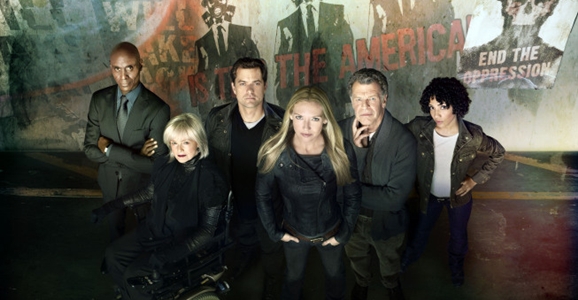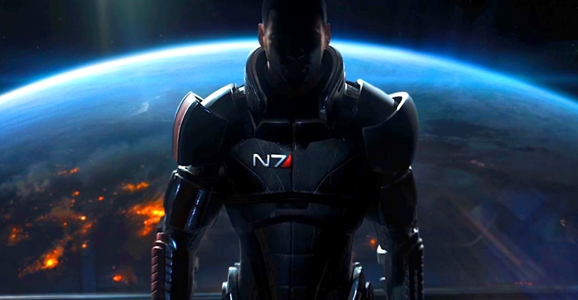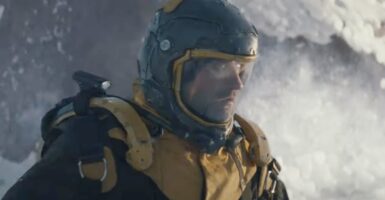Walkers, Loopers, And Judges: The Best Science Fiction Of 2012
We found a lot to love in 2012.
This article is more than 2 years old
Well, 2012 has come and gone. The year rolled over without any apocalypses, and without me thinking about that godawful Roland Emmerich movie, at least until just now. With another trip round the sun beginning, what’s an entertainment site to do except look back, reflect, and make a snarky list? Okay, actually we’ve made two snarky lists, but we’ll get to the other one tomorrow.
2012 was the year when The Walking Dead found its footing again, when Joss Whedon finally earned the mainstream cred we’ve all known he deserved for years now, and when Community was nominated for a friggin’ Hugo. Here are the 2012 science fiction milestones that made us want to stand up and high-five the genre.

The Cabin in the Woods
David says: While Joss Whedon got the props he’s deserved for years because of the blockbuster Avengers, I think his other flick this year was as good as, if not better than, the superhero slug-out. Directed by and co-written with Whedonverse alum Drew Goddard, The Cabin in the Woods was nearly impossible to sum up in a trailer without spoiling the game, so it suffered from marketing that made it look like the very thing it was commenting on. If you still haven’t watched it and have somehow made it this long without being spoiled, for the love of God watch it ASAP. Other movies may have made more money or earned more buzz, but there’s no other flick that was as much fun to sit through this year than The Cabin in the Woods.
Cloud Atlas
David says: Boy, the Wachowskis don’t make it easy for themselves, do they? After the disappointing Matrix sequels and the colossal fustercluck that was Speed Racer, the filmmaking siblings went into radio silence for years. When they popped back up this year, it was with Cloud Atlas (co-writen/directed with Tom Tykwer), a time-hopping, multi-layered epic that leaps from the past to the far future, and with actors playing multiple roles in the different eras, some swapping gender and/or ethnicity, all in an interwoven narrative that challenges its viewers to figure out for themselves what it all means. In many ways, Cloud Atlas is a muddled, confusing mess. It’s also, at its best, stunningly beautiful, emotionally powerful, and very, very human.
Community Got Nominated for a Hugo
David says: That’s really all I have to say about it. I’m just happy to live in a universe where this is a thing that happened.
Dredd
David says: I’m not going to sit here and tell you that Dredd is one of the best movies of the year. It’s not. It is, however, a blast and a half, a movie that perfectly understands the kind of story it wants to tell, and then does so in spectacular, hyper-violent fashion. By keeping the story simple and self-contained — Judge Dredd and a rookie partner must fight their way up a mega-skyscraper to capture or kill a ruthless drug kingpin — screenwriter Alex Garland and director Pete Travis are able to introduce the basics of Dredd’s world, then step back and let the man do what he does best. Which is kill the hell out of bad guys while looking badass. Dredd is exactly the Judge Dredd movie I wanted to see, and the fact that its underperformance at the box office means we won’t get any sequels is still one of my biggest disappointments of 2012.

Fringe
Brent says: Given that this is the fifth and final season of Fox’s Fringe—at the present time only three episodes remain—you wouldn’t blame the cast and crew if they just sat back and phoned it in. Thankfully, that hasn’t happened so far. This may be the end, and they may only have 13 episodes to work with, but that certainly didn’t stop Fringe from pulling out all the stops. They’ve made bold choices in the past, like blinking one of the main characters out of existence, but after a fourth-season finale that saw another primary character shot in the head and brought back to life, they decided, hey, why not vault the show a few decades into the future? That may sound like a crazy choice, but you know what? They pulled it off. Not only has season five been incredibly strong front to back, Fringe continues to be maybe the best show on TV, thanks in large part to the confidence to take these unexpected turns, as well as the best collection of characters on primetime.
John Carter
David says: Along with Dredd, John Carter is the 2012 offering that I desperately wanted to succeed and lead to sequels. Crippled by a harebrained marketing campaign that often seemed embarrassed by its own subject matter, I’m honestly surprised that anybody went to see John Carter who wasn’t already a fan of Edgar Rice Burroughs’ classic books. And that’s a damn shame, because while John Carter was far from a perfect film, it was an old-fashioned, rip-roaring adventure yarn of the sort we don’t see nearly enough these days. Yes, the story could have used a bit more streamlining. And yes, Taylor Kitsch wasn’t the most dynamic protagonist. But neither of those facts detracted from my enjoyment, and sitting there in the theater next to my father, the man who first introduced me to Burroughs’ Barsoom, director Andrew Stanton transported me to a world I’d been dreaming of since I was in short pants. I dearly wish we could explore the world more in sequels, but if John Carter has to remain a wistful case of “if only,” so be it.
Looper
David says: From the moment Brick carved a smoky, noir-tinged murderhole in the middle of the traditional high school movie, Rian Johnson established himself as one of this generation’s most interesting and talented writer/directors. And the news that he was going to be making a science fiction film? Christmas in July, baby (actually September, but whatever). The core notion of Bruce Willis and Joseph Gordon-Levitt playing the same character at different ages, with the younger tasked with killing the older, was rich with possibility, and the two actors definitely milked the concept for all its worth. But where Looper really impressed me is with its ability to surprise me, to reveal that the one-line pitch we’d all heard was just the beginning of the story.
Rudie says: Rian Johnson dazzled general audiences with his time travel film Looper. It took a real life look at time travel and gave audiences a taste of heavy science fiction without confusion or obvious plot holes.

Mass Effect 3
David says: If you were to Google “Mass Effect 3” in the weeks after the game’s release, 99% of what you’d have found was stories complaining about or commenting on the game’s controversial ending. And honestly, I understand those complaints, even if I think some of them were blown drastically out of proportion. But for me, even if the ME3 ending was the worst thing I ever experienced — which it wasn’t, remotely — that doesn’t discount the countless hours I’ve spent playing the games since the first one’s release in 2007. I’ve spent more time exploring the world of Mass Effect than any other fictional world outside of Star Wars, Star Trek, and maybe Babylon 5. And I think the universe created for the Mass Effect games is every bit as rich and filled with potential as those that came before. I remember thinking, back when the original Mass Effect first came out, that it was as if BioWare had reached inside my brain and crafted the perfect game I’d been daydreaming about for decades, but which nobody had managed to realize yet. That’s a rare thing, and I can’t wait to see where the series goes from here. In the meantime, I’ve got some DLC to play.
Red Dwarf
Brent says: Cards on the table, I haven’t actually been able to watch Red Dwarf X yet. Still, the first proper season of the British sci-fi sitcom since 1999—I barely count the underwhelming three-episode arc Back to Earth—is a welcome addition to the world indeed. From all appearances and reports, the tenth season of Dave Lister, his hologramatic bunkmate, a man descended from cats, and a neurotic domestic service droid is a return to form for the ridiculous, ridiculous series. “The Boys From the Dwarf” are back where they belong, poking around deep space, running afoul of all manner of nefarious space creatures, and just generally getting into all sorts of deep shit. The knowledge that one day I’ll get to see these episodes is one of reasons I bother getting out of bed in the morning.
Sci-Fi Comics
David says: Bryan K. Vaughn’s Saga. Paul Cornell’s Saucer Country. Ken Garing’s Planetoid. For whatever reason, 2012 was a particularly fruitful year when it came to quality new sci-fi in comic-book form. All three served up something different for genre fans. Saga is a sprawling, surreal space opera wrapped around a love story between two star-crossed lovers and their infant daughter. Saucer Country mixes West Wing-style political intrigue with X-Files-style UFO mythology. And Planetoid is a sparse, stripped-down story of a mercenary stranded on a mysterious, mechanically overrun world. If you’re not already reading them, all three are worth picking up.

Smaller Sci-Fi Films
Brent says: 2012 was a good year for off-the-beaten-path science fiction movies. In this category I lump together low-budget/high-concept movies, as well as smaller international offerings that most mainstream audiences didn’t have the chance to see. Safety Not Guaranteed made enough noise this year that director Colin Trevorrow’s name was even bandied about as a possibility for the Star Wars: Episode VII job. Great performances from Aubrey Plaza, Mark Duplass, and Jake Johnson combined with a quirky is-this-guy-crazy-or-can-he-really-travel-through-time story to create something as moving as it is funny.
Sound of My Voice takes a similar approach, with a very different tone. Obsession, fanaticism, and faith take center stage as a pair of aspiring journalists attempt to debunk a cult leader who claims to be from the future.
Irish writer/director Alan Brennan’s debut film, Earthbound, is another instance of a small, independent movie using sci-fi as a framing device. Joe Norman (Rafe Spall) is the last surviving son of the planet Zalaxon. At least that’s what his father told him before passing away when Joe was just a boy. Is this the truth, or just a lie told to Joe to give his bland, humdrum life purpose? Earthbound is a romantic, funny, and touching take on looking for hope and meaning in your everyday life.
And as if waking up after a drunken, one-night stand isn’t awkward enough, just wait until an alien invasion shows up. That’s the premise of Nacho Vigalondo’s Extraterrestrial. A gleeful screwball romantic comedy, the film just so happens to be set against a sci-fi backdrop, which Vigalondo makes full use of.
David says: This category isn’t complete without a tip of the hat to two of the year’s best surprises. Seeking a Friend for the End of the World’s pairing of apocalyptic cynicism with rom-com sweetness seemed as unlikely as, well, as Steve Carell romancing Keira Knightley. Against all odds, both worked far better than I could have expected, resulting in a sweet, wistful movie that deserves more attention than it got.
Then there’s Robot & Frank, easily one of the best movies of the year that damn near nobody actually saw. Frank Langella stars as a retired thief trudging through his supposed golden years in a thoroughly depressing fashion. When his son hires a helper robot to assist him around the home, Frank at first resists the notion that he can’t take care of himself. When his son won’t take no for an answer, Frank is stuck with the ‘bot…but soon realizes that its very specific programming could make it a perfect sidekick for an old con looking to pull one last job. Part heist movie, part sentimental odd couple pairing, Robot & Frank does what all the best science fiction does: uses futuristic ideas to comment on human nature, and struggles that are at least as old as our species self-awareness.
Star Wars Resurrected
David says: Prior to this past October, Star Wars was more or less dead to me. I don’t mean the universe in general — I’m still enjoying The Old Republic and eagerly looking forward to 1313 — but the notion that I’d ever see any more Star Wars movies on the big screen, or at least any I’d actually like to sit through, seemed a dim and distant possibility. Then, out of nowhere, Disney swoops in and single-handedly made me excited about Star Wars all over again. Regardless of your feelings about the Star Wars prequels, there’s no question that George Lucas absolutely deserves our appreciation and respect for creating a universe many of us have been absorbing since grade school. But the past decade and a half has not been kind to Star Wars, nor to the notion that Lucas still had a vision for it that anyone over the age of six could appreciate.
The news that it was Disney who would be given the reins of Star Wars was particularly intriguing. With Avengers a monster box-office hit, they’d deftly established a coherent cinematic Marvel universe that seemed impossible a decade ago, primarily by hiring smart, passionate, talented people and then stepping back and letting them play with the characters they’ve loved for years. By all accounts that’s the same approach Disney is planning for Star Wars, and by my reckoning that is very, very good news indeed.
Rudie says: Disney’s acquisition of Lucasfilm and the Star Wars franchise was probably the best thing to happen to sci-fi geeks in 2012. By promising Episode VII in 2015, Star Wars can now branch off to a future generation of fans while placating to the older ones. Hopefully we’ll all forget how terrible Episode I was.
Top-Notch Sci-Fi Lit
Nick says: Genre-masher Peter Clines released an addictive monster upon worlds in all dimensions with 14, a novel that speedily drives through the oddball history and mystery of an L.A. apartment complex. With nods to Scooby Doo, steampunk architecture, and increasingly surreal antagonists, it’s a film within pages that isn’t meant to be put down before finishing.
David Wong, senior editor at Cracked.com and author of the cult psycho-sensation John Dies at the End, released that novel’s sequel, the far more depressing This Book Is Full of Spiders. It’s an apocalyptic read that feels like the 28 Weeks Later to the first novel’s 28 Days Later. The novel separates the main characters for much of the novel, but finds different ways of telling a tale that could alter the history of humanity, in a way that is filled with gun-toting revolutionists, trans-dimensional spider creatures, and modifications of space-time. And dick jokes.
Richard E. Gropp’s Bad Glass uses a photographer’s verve to capture filmed history inside Spokane, a city that has been abandoned due to an unexplained phenomenon where people disappear into structures and the sky runs red, which the characters interact with more and more, while understanding less and less. It’s yet another novel I love that takes a limited group of characters and gives them a city’s sandbox for imaginatively frightful shit to happen in, all while unveiling the secrets behind the strangeness.

The Walking Dead (The Show)
Brent says: A huge fan of Robert Kirkman’s comics, I wanted AMC’s The Walking Dead to be good right out of the gate. While there have always been commendable elements to the show, one of the biggest knocks is that nothing happens. Season two of the zombie drama was bogged down in endless rhetoric and tedious back-and-forth between Rick (Andrew Lincoln), Lori (Sarah Wayne Callies), and Shane (Jon Bernthal). Season three, however, has righted the ship in the most pleasing possible way. While still an up-and-down ride to a degree, The Walking Dead has never been more consistent, action packed, or dramatic than it is right now. Zombies are everywhere, important characters are dying at a rate that makes you realize no one is safe, badass new characters have joined the fray, and everyone is in constant danger. Now more than ever, the rag-tag group of survivors exists on the edge of cliff, walking the fine line between continued existence and annihilation.
The Walking Dead (The Game)
Nick says: Telltale’s The Walking Dead did exactly what Telltale is known for, giving interested game players an involved romp through an established brand, and became an episodic example of an unrivaled experience in video game culture. I can only think of Heavy Rain to describe a game that inserts emotionally invested decision-making into a solely story-driven plotline. It’s point-and-click, so it isn’t as action-oriented and button-heavy as the usual console games, and excuse me not referencing other games in this genre. The action is present at every turn, and the dialogue is as important as any item you need to find, as your decisions deliver different outcomes and endings. Beyond Lee, a wronged murderer whose care for a possibly orphaned child drives the story, other characters aren’t worth getting into because they sometimes come and go depending on how you feel at that particular moment. Packing multi-comic and multi-TV episode plotlines into an all-new side of the Walking Dead universe, there was nothing like it, and few times this year did I feel as guilt-ridden and triumphant in front of a laptop screen.











